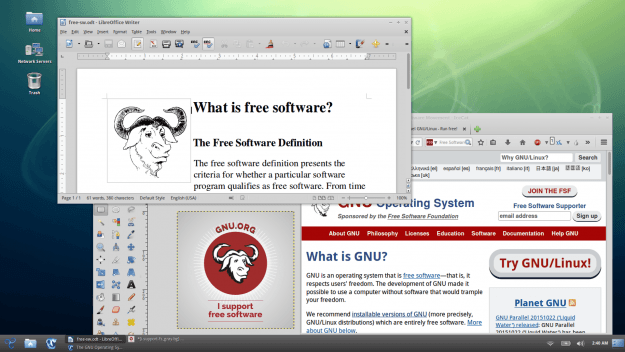Even if you’re a liberal arts major with no background in technology or science, using Linux and other free software can empower you to take control of your computing environments.

This year marks my 20th anniversary of using Linux. I discovered it when applying for a position at a startup called Stormix Technologies. Stormix long ago had its moment of glory and flamed out, but working for it left me a dedicated Linux user. I didn’t know at the time, but my entire relationship to computing changed permanently as a result.
To begin with, it’s been sixteen years since I bought a piece of software — and that was reluctantly, in order to complete work for a client. It’s been even longer since I was tempted to pirate software. Both facts imply the same thing: unlike most computer users, I stopped being a consumer of software. What I became instead was part of an ecosystem of users, and a potential partner in development if I chose to be. These days, purchasing and pirating software alike seem like a quaint custom of the past, like cranking a car before driving. I look with pity on those who purchase or pirate, regarding them as unnecessarily trapped in a toxic relationship.
Having stopped consuming software, I also changed my relationship with the manufacturers of software. As a consumer, I had almost no contact with those who wrote the software I used. Mostly, I would get news of updates (read: another chance to spend money). If I ran into troubles, I might contact technical support, and more often than not, endure being asked a series of obvious questions while I fumed with impatience waiting to be given a fix. Tinkering on my own was forbidden by license, and mostly impossible since I had no access to the source code.
By contrast, free software does things differently. The original writer of the software, or at least the current project leader, is often just an email or a text away. Admittedly, some projects neglect to post contact information on their web sites, but it is a rare person who is completely uncontactable, if I only try hard enough. Admittedly, part of the same power imbalance that is in proprietary software remains (to say nothing of the same condescending tone, at times), but the point is, I have greater accessibility when dealing with free software developers. I am less helpless, and more likely to find a useful contact when I need one. Thanks to forums and online documentation, often I do not even need to talk to a person to find a solution. I am less dependent than I used to be as a Windows user.
Something else that has changed is vendor lock-in. In proprietary software, choice is often limited. Monopoly, or at least oligarchy generally prevails. If nothing else, having installed a piece of software, it is inconvenient and costly to investigate rival applications. However, most of the time investigating an open source alternative is relatively simple. Installation is free, and can often be done directly from your distribution’s repositories, or at worst, after compiling from scratch. In a couple of hours, I can install, for example, half a dozen desktop environments, explore them, and decide which I prefer. I am not limited to my distribution’s default, and I can make an informed decision about which software to use. I have a choice in a way I do not with proprietary software.
The same is true within the application. Since starting to use Linux, I have come to expect that the software I use will allow me both to customize to please myself, and to work the way I please — not as some anonymous developer thinks it should. The reason why I favor KDE’s Plasma is simply because it offers more customization than any other desktop environment. The fact that Plasma offers more choices than I immediately want is besides the point; I am reassured simply by having so many choices. More — with four virtual desktops and six Activities organized by task, my Plasma desktop is fine-tuned precisely for my needs and preferences. Like the advantages I have already mentioned, the ability to customize gives me more control over my computing.
However, the greatest effect of being a free software user is the increased sense of agency. Windows and MacOS users are taught helplessness by their operating system. They may install software and maybe do some basic administrative work, but they are discouraged from doing anything more. In comparison, because free software began without any support, its users had to learn to be self-sufficient. Configuration was through text files, which remains true today, even though many applications now provide detailed graphical tools. Moreover, a massive amount of documentation is available online, although sifting through it to find what is still relevant and not outdated can be a chore.
The assumption soon seeped into me that I can fix or adjust everything myself, and after six months or so of Linux, I started to do so. Before long, I was doing all sorts of maintenance that I never would have dreamed of attempting under Windows. The fact that, long ago, I was an English major and was never expected to do that, only makes my sense of accomplishment greater. I know my way around my Linux installation more than I ever did when running Windows, and when I am at a loss I never hesitate to research or tinker.
The result is that my workstation and laptops feel more like mine. I have more say in how I interact with them, and most of the time, I can keep them in working order. They are no longer a black box that I interact gingerly with, half expecting them to catch fire or explode at my first misstep.
Ultimately, I think, these advantages can all be attributed to the GNU General Public License. When nobody has special rights in software, paradoxically it becomes the property of everyone. I may never venture beyond the writing of simple scripts, yet my Linux machines are mine in a way my Windows ones never were. Free software has changed my relationship to my computers, and entirely for the better. The rare time I interact with Windows machines, I feel crippled, and I know there’s no going back.
Bruce Byfield has been involved in FOSS since 1999. He has published more than 2000 articles, and is the writer of “Designing with LibreOffice,” which is available as a free download here.





Quote: “However, the greatest effect of being a free software user is the increased sense of agency. Windows and MacOS users are taught helplessness by their operating system.”
Linux is getting there in my opinion. I started with Zorin, but no longer use it. Zorin (and others) is getting to much like MS Windows, to many “Linux” functions are hidden or locked. The quest to win Windows users has not worked, and a more locked down OS is not the answer.
@Jim: Zorin is “getting too much like MS Windows”? Dude, this is what Zorin 1.0 looked like, in 2009:
https://commons.wikimedia.org/wiki/File:Zorin_OS_1.0_screencast.ogv
You chose a Linux distribution that was designed for the explicit purpose of looking and feeling like Windows, and you’re complaining that it’s “gotten too much like Windows”.
If you wanted a taco and you went to a Chinese restaurant, would it be the restaurant’s fault for not having what you want, or your fault for going to the wrong restaurant?
Nobody’s stopping you from using Arch, or Gentoo, or Slackware, or Linux From Scratch. Or, for that matter, FreeBSD or OpenBSD.
The great thing about FOSS is there are plenty of choices. You want an OS for power users? You have plenty of options. You want an OS that’s easy to use for someone coming from the Windows world? There are plenty of choices there, too. You want tacos? Maybe try a taco shop instead of going to a Chinese restaurant and complaining about the food they serve.
I use Manjaro. My grandpa uses Mint. There’s plenty of room in this world for both of them. I’m not upset that Mint provides a streamlined experience and looks a lot like Windows. I’m thrilled that I had an opportunity to get my grandpa off of Windows without causing him too much inconvenience.
One of the best things for me, is the longer lifespan of the hardware. While my surplus computer stores are a thing of the past, used hardware is still obtainable, and when I want something, or something for a learning project, I can go from a Raspberry PI, to an older laptop/desktop, etc, instead of the latest and greatest, at a much lower cost.
Sometimes reusing is a good thing (kind of like how your reusing this site for publishing, while the original authors seem to have vanished).
@Randal: On a related note, my project this past weekend was flashing the firmware of an old 2006 iMac with Libreboot. Not only did it fix the stock firmware’s issues with booting 64-bit Linux and booting from USB, it also increased the amount of addressable RAM (I’ve got 4GB in there; the stock firmware wouldn’t even boot with more than 2GB, whereas Libreboot recognizes 3GB out of the 4).
I don’t even know what I’m going to do with that computer (maybe a Kodi box in the laundry room?), but it’s pretty neat knowing I can do *something* with it.